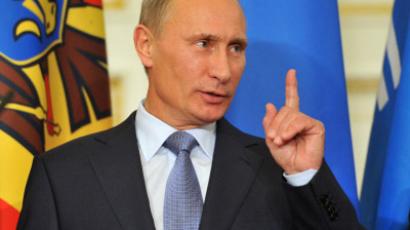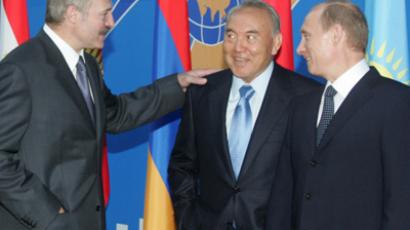Putin trumpets Russia’s ‘cultural dominance’
The Russian Prime Minister, a top contender for upcoming presidential elections, is providing voters with more food for thought as he promotes his plan for uniting Russia’s multi-ethnic society.
Coming one week after the release of an article that addressed the development of Russian civilization, Vladimir Putin is setting his sights on another penetrating subject, this one involving the importance of uniting Russia’s various ethnic communities together under the banner of Russian culture and values. “For Russia – with its wide range of languages, traditions, ethnicities, and cultures – the national question is, without exaggeration, of fundamental value,” Putin wrote in an article for Nezavisimaya Gazeta daily on Monday. “Any responsible politician, public figure, must recognize that one of the main conditions of our country’s very existence is civil and interethnic harmony.”Putin draws attention to the modern problem of “colossal immigration flows” representing millions of people worldwide who are “in search of a better life.” These surging numbers of emigrants and refugees, who are fleeing from “hunger and chronic conflicts, poverty and social unrest” are forcing even the most developed and tolerant nations to address the “national question.”
Multiculturalism creates multi problems
In the midst of this great global experiment, unprecedented in its scope, Putin notes that the “melting pot” of assimilation is…unable to “digest” the growing migration flow.He also criticizes the move toward multiculturalism, which he says “rejects the notion of integration through assimilation.”Multiculturalism “elevates the (idea of the) ‘right of minorities to be different’ to the absolute and, at the same time, insufficiently balances this right with civil, behavioral, and cultural obligations in regard to the indigenous population and society as a whole,” Putin argues.What multiculturalism is leading to in many countries, according to the Prime Minister, is the formation of “closed national and religious communities…which not only refuse to assimilate, but [do not] even adapt.” Putin expressed his astonishment that “neighborhoods and entire cities where generations of immigrants are living on welfare…do not speak the language of the host country.”There can be just one outcome for such a social model: xenophobia on the part of the indigenous population, which understandably seeks to “protect its interests, jobs, and social benefits from the ‘foreign competitors.’”
Russia as a 'historic state'
Putin demonstrates that Russia’s “national question” is fundamentally different from that of Europe and the United States, which are experiencing a great tide of newcomers at tremendous political risk. Russia, by comparison, witnessed its own influx of immigrants as a result of the collapse of the Soviet Union.“Our national and immigration problems are directly linked to the collapse of the Soviet Union,” Putin stressed.Discussing the collapse of the Soviet Union, which Putin described on a different occasion as "the greatest geopolitical catastrophe of the century," he does not conceal his outright contempt for those who micromanaged the process.“The ‘union center’ (which was Moscow, the Russian capital)…while trying to put pressure on the opponents, engaged in a behind-the-scenes game with the Russian autonomies, promising to raise their ‘national and statehood identity,’” Putin explained. “Today, the participants in these processes are pointing the finger at one-another. But one thing is clear – their actions led inevitably to disintegration and separatism.”Putin’s verdict on the political outcome is unmistakably harsh: “They did not have the courage, or the responsibility, or the political will to successfully and insistently defend the territorial integrity of the Motherland.”As a result of this disorganized breakup of the Soviet Union, Russia was exposed to a massive wave of successive challenges, including an “ethnically motivated” civil war in the Caucasus, near economic insolvency, and an assortment of other deadly bullets.Despite these grave threats to its existence, however, “Russia did not disappear,” Putin stressed.After quoting the famous Russian historian Vasily Klyuchevsky (“When the political ties of public order fractured, the country was rescued by the moral will of the people”), Putin reminded his readers that National Unity Day (celebrated on Nov. 4)… “is in reality the day of victory over ourselves, over internal animosity and strife, when classes and nationalities acknowledged themselves as being one community – one nation.”Putin believes the victory to be so significant that "We have the right to consider this holiday the birthday of our civil nation. “
Russia is not a "melting pot"
The essence of the “national question” for Russia – which Putin stresses “is not an ethnic state or an American melting pot where everyone is, one way or another, an immigrant” – is that the country is a multi-ethnic state “with an ongoing process of mutual adjustment, mutual understanding, and unification of people through families, friendship, and work.” Russia is a state with hundreds of ethnicities, living on their land together and near Russians, he explained.Putin went on to quote the philosopher and writer, Ivan Ilyin, in a passage that is meant to underscore Russia’s historical respect for all creeds and colors: “Not to eliminate, not to suppress, not to enslave other people’s blood, not to stifle the life of different tribes and religions – but to give everyone breath and the great Russia…to honor all, to reconcile all, to allow everyone to pray in their own way, to work in their own way, and to engage the best in public and cultural development.”The leads to the very heart of Putin’s plan for uniting the multi-ethnic nation: “The core, the binding fabric of this unique civilization – is the Russian people, Russian culture.”Then, in what appears to be a reference to his political opponents, Putin goes on to warn that “various instigators and our opponents will make every effort to tear out of Russia – with false assertions about the Russians’ right to self-determination, ‘racial purity,’ and the need to ‘finish the job of 1991 and complete the destruction of the empire, sitting on the necks of the Russian people’ – in order to ultimately force people to destroy their Motherland with their own hands.”
Celebrating Russia's "cultural dominance"
Putin performs a delicate balancing act in his article by celebrating Russia’s “cultural dominance” on the one hand, while warning against the “bacilli of nationalism” on the other. In discussing Russia’s cultural dominance, Putin notes with satisfaction that “many former citizens of the Soviet Union, who found themselves abroad, are calling themselves ‘Russian’ – regardless of their ethnicity.” At the same time, however, he laments the fact that “ethnic Russians have never…formed stable national diasporas,” despite the fact that they had a “profound quantitative and qualitative presence,” which is attributable to the “different cultural code” of the Russian people.“Russian people are nation-forming…the great mission of Russians is to unite, and bind the civilization,” he adds. Putin then makes what are arguably the article’s most controversial comments, which allude to the “cultural dominance” of the Russian people.“This civilizational identity is based on preservation of Russian cultural dominance, which is not only carried by ethnic Russians, but all carriers of this identity regardless of nationality,” Putin writes. “This is the cultural code that has, in the recent years, been subject to some serious trials, which people have tried and continue to try to break. And it has, nevertheless, prevailed. At the same time, it needs to be nourished, strengthened, and protected.”What is the source of Russia’s cultural greatness? Expertly skirting any sign of espousing nationalism, which could be used by his political opponents, Putin credits education (as opposed to some sort of more Darwinian biological explanation, for example) with producing fine specimens of Russian stock.“A great role here is played by education,” he argues. “The civil goal of education, the educational system – is to give every person the required volume of knowledge of the humanities, which forms the basis of people’s self-identity.”Putin’s call for enhancing education to continue with Russia’s tradition of cultural domination requires nothing more than getting students to open their books, which naturally requires some government involvement. “Our nation has always been a nation of readers,” he notes. “Let’s survey our prominent cultural leaders and compile a list of 100 books that must be read by every Russian high school graduate – and not simply regurgitated in school, but read on their own time.”Putin then turns his attention to other tools for promoting Russian cultural norms, including “television, cinema, the Internet, and popular culture in general, which shape public opinion and set behavioral examples and norms.”The Russian Prime Minister even praises Hollywood, which allowed the United States to “shape the consciousness of several generations, and did so while introducing not the worst-possible – in terms of national interests and public morality – values. There is something to learn here.”Putin stressed he is not advocating some kind of encroachment on the freedom of creativity or censorship, but rather making it clear that the state “must and has the right to direct its efforts and resources toward the resolution of recognized social and public problems. This includes formation of a worldview that binds the nation.”Rounding off his plan for uniting the country’s various edges, Putin advocates building a “national policy strategy, based on civil patriotism.”“Any person living in our country should not forget their faith and ethnicity,” he writes. “But before anything else, he must be a citizen of Russia and be proud.”Putin then reiterated his support for the nation’s many religious institutions, while reminding readers of the “secular nature” of the state.“And, of course, we are counting on an active involvement in this dialogue of Russia’s traditional religions,” he said. “The foundations of the Christian Orthodox Church, Islam, Buddhism, Judaism – with all of their differences and peculiarities – include basic, shared moral, ethical, and spiritual values: compassion, reciprocity, truth, justice, respect for the elders, family and work values. These value systems cannot be replaced by anything: and we need to reinforce them.”At the same time, the secular nature of our state must be preserved, he added.Finally, Putin stressed the importance of developing Russia’s democratic, multi-party system.“Today, decisions are being made aimed at…liberalizing the registration and operational process of political parties, as well as an initiative to return the elections of regional governors.” The Russian Prime Minister, however, singled out those who “rely on nationalistic, separatist, and similar forces and groups.”These organizations must be immediately, within the framework of democratic judicial procedures, excluded from the electoral process, he stressed.Read full text of Prime Minister Putin's text here.Robert Bridge, RT














